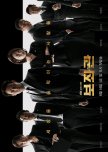Cette critique peut contenir des spoilers
House of Kards
I had this planned on my watchlist since the beginning of my journey into k-drama, mostly because of Shin Min-Ah (she's fabulous, beautiful and talented and I want to be just like her when I grow up…) but also because I really dig the political subgenre (my second most favorite after historical dramas, and immediately followed by sci-fi. Turns out romantic dramas are really my least favorite)
My overall judgement is positive, but I really wouldn't recommend this to any k-drama neophyte. I found it difficult to watch because I was often bored. It took me almost 3 weeks to finish all the 20 episodes (1st and 2nd season) and I had to mix it with something else (Divorce Attorney Shin was the perfect buffer). Ultimately, I am glad to have persevered to the last episode because it was satisfying enough to deem the whole experience as positive.
Basically, the main theme hinges on an ethical conundrum of Machiavellian inspiration:
how evil can good guys go when fighting evil in order to still be considered good guys? Do you need to fight dirty to prevail in a corrupted and unfair fight?
The answer to this question is universally controversial and I liked the one in the drama well enough, however the execution was rather poor.
Writers (Lee Dae-il, who also adapted the original comic for Bring it on, Ghost!) could have delved deeper and dared more since they had a great cast that could definitely sustain a heavier load.
Politics is complex and if one decides to explore the shades of grey behind it, they cannot resolve the issue by reducing it to black and white.
During the watch I was reminded of two personal favorites in the genre, House of Cards and the West Wing. Yet the similarity goes only as far as the setting since Chief of Staff lacks the depth, the intricacy and the absolute commitment to the story, characters and political commentary that those two masterpieces have.
Here the story is oversimplified and, in my totally unessential opinion, that is in detriment to the overall vibe.
I like when writers trust their audience with the complexity of fiction that mimics the truth of life.
That is one reason why I really appreciated Stranger, for example.
I love Lee Jung-jae and I find his voice beautiful, still the first person narration sounded awkward to me most of the time.
I really liked when they talked about abortion though.
Also, I liked the glimpse of fanservice amidst the seriousness ( Do-Kyeong's great abs were good for the morale).
Therefore my score is earned in full by the actors' performance, the bits of political commentary and the happy ending.
FES(5/5) Shin Min-Ah in power suits is indeed powerful!
My overall judgement is positive, but I really wouldn't recommend this to any k-drama neophyte. I found it difficult to watch because I was often bored. It took me almost 3 weeks to finish all the 20 episodes (1st and 2nd season) and I had to mix it with something else (Divorce Attorney Shin was the perfect buffer). Ultimately, I am glad to have persevered to the last episode because it was satisfying enough to deem the whole experience as positive.
Basically, the main theme hinges on an ethical conundrum of Machiavellian inspiration:
how evil can good guys go when fighting evil in order to still be considered good guys? Do you need to fight dirty to prevail in a corrupted and unfair fight?
The answer to this question is universally controversial and I liked the one in the drama well enough, however the execution was rather poor.
Writers (Lee Dae-il, who also adapted the original comic for Bring it on, Ghost!) could have delved deeper and dared more since they had a great cast that could definitely sustain a heavier load.
Politics is complex and if one decides to explore the shades of grey behind it, they cannot resolve the issue by reducing it to black and white.
During the watch I was reminded of two personal favorites in the genre, House of Cards and the West Wing. Yet the similarity goes only as far as the setting since Chief of Staff lacks the depth, the intricacy and the absolute commitment to the story, characters and political commentary that those two masterpieces have.
Here the story is oversimplified and, in my totally unessential opinion, that is in detriment to the overall vibe.
I like when writers trust their audience with the complexity of fiction that mimics the truth of life.
That is one reason why I really appreciated Stranger, for example.
I love Lee Jung-jae and I find his voice beautiful, still the first person narration sounded awkward to me most of the time.
I really liked when they talked about abortion though.
Also, I liked the glimpse of fanservice amidst the seriousness ( Do-Kyeong's great abs were good for the morale).
Therefore my score is earned in full by the actors' performance, the bits of political commentary and the happy ending.
FES(5/5) Shin Min-Ah in power suits is indeed powerful!
Cet avis était-il utile?






